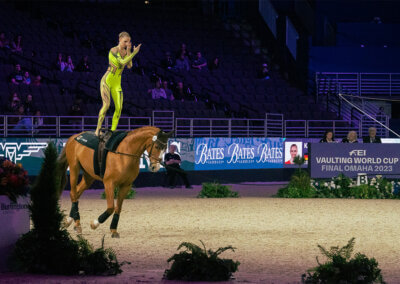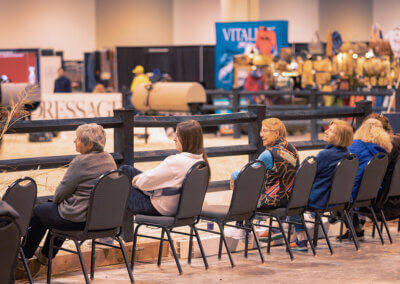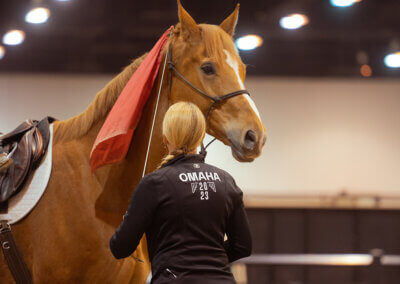One of Omaha and Nebraska’s major tourism draws took place in early April when the Omaha Equestrian Foundation presented the 2023 FEI World Cup™ Finals April 4-8 at the CHI Health Center.
The event is the world’s biggest individual equestrian competition and attracts an international audience. It brought Olympic Gold Medalists and some of the world’s greatest equestrian athletes to Nebraska. It also drew international tourists who lodged in metro Omaha, dined at local restaurants, visited the state’s attractions, and spent money shopping at area retailers.
Plans to host this year’s competition received a major boost when the Nebraska Department of Economic Development (DED) awarded the Omaha Equestrian Foundation $500,000 of federal American Rescue Plan Act funds through the International Competition Sponsorship Program. The purpose of the grant was to strengthen Nebraska’s travel, tourism, and hospitality industry after the significant impacts of the coronavirus pandemic.
“The FEI World Cup Finals brought equestrian’s finest international competitors to Nebraska—along with spectators from across the globe,” said DED Interim Director Joe Fox. “Hosting a high-profile event of this caliber boosts Nebraska’s profile. It also has a major economic impact through the tourism it generates. Congratulations to the city of Omaha for hosting an immensely successful World Cup Finals!”
Grant funding from DED helped cover the substantial costs of hosting the World Cup Finals, which requires an operating budget of $10 million. To host the prestigious World Cup, a city must win a highly competitive bidding process, and the ability to raise funds is a must. Omaha last hosted the event in 2017. This year, the city was able to edge out Riyadh, Saudi Arabia to land the World Cup Finals.
Julie Boilesen, CEO of the Omaha Equestrian Foundation, said the support from DED made the group’s fundraising goal much more attainable. “It’s invaluable to show State support to the city and county,” she said.
The application process for securing the grant was relatively easy, Boilesen said. The Foundation worked with a local state senator and testified before a committee of the Legislature. They were then invited to apply for the DED grant. “We would get on the phone, and they (DED) would answer any questions we might have,” she recalled. “It was a fairly fast application cycle.”
Boilesen shared insight on putting together a successful award application. “I think we demonstrated a need for the grant to begin with,” she suggested. That included showing why it would be important to the state and demonstrating the event’s past success. The Foundation also detailed the massive economic impact the event would have on the city and state.
The opportunity to host “competitors from 26 foreign counties and ticket buyers from 38 foreign countries and all 50 states,” was a main benefit Boilesen emphasized. Many of these guests would not otherwise visit Nebraska, especially those coming from international destinations. “It’s really a completely different audience,” she said, and it’s one that has money to spend.
Boilesen said planning for a major event like the World Cup Finals requires understanding your numbers and the benefits of your event so you’re telling a clear story to potential funders. She also suggested visiting with other cities that have held similar events to gauge how you stack up.
The DED grant helped the Omaha Equestrian Foundation complete construction work needed to host the World Cup Finals. To successfully host the competition, the Foundation had to build a stable and four warmup arenas and take out five rows of seats from the floors of the CHI Health Center. They also needed to build an LED-lined competition arena. Additionally, the north end of the area had to be staged for broadcast and show production and arranged to provide room for the judges and the juries. On top of the construction costs, the Foundation flew in 50 horses from Europe.
Tourism generated by the World Cup makes all of the preparation pay off handsomely. The Omaha Equestrian Foundation is still calculating the final economic impact from this year’s World Cup, but event organizers anticipate the impact to be impressive. “In 2017 it was $19.4 million,” Boilesen said, “or about $4 million a day.”
If that’s how things shake out this year, expect to see Nebraska mount another effort to host the World Cup Finals in the coming years.



